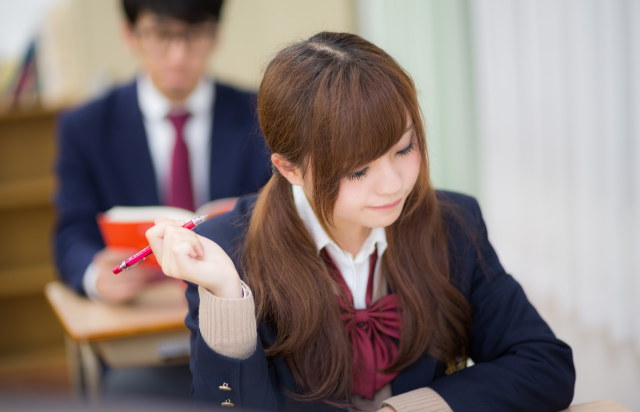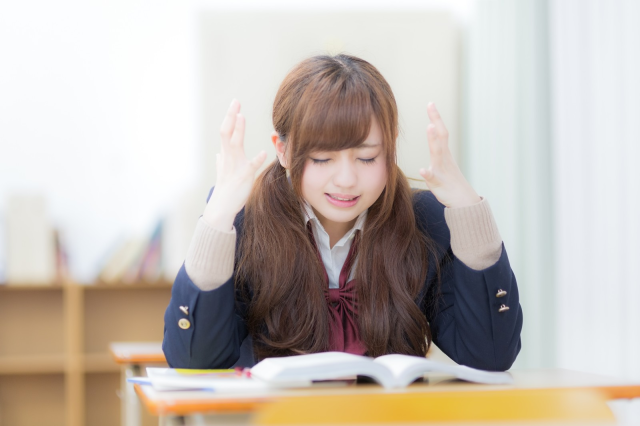
Pledge comes in the wake of 2.2 million-yen lawsuit from naturally brown-haired schoolgirl in Osaka.
The overwhelming majority of middle and high school students in Japan are required to wear uniforms, and so it’s no surprise that Japanese schools tend to have lots of other rules governing students’ personal appearance. One that’s been attracting controversy in recent years, though, is a requirement at some schools that all students must have black hair.
The ostensible reason for the rule is that almost all Japanese people have naturally black hair, and so they’ll only have non-black hair if they’ve chosen to dye it a different color. Such willful, discretionary standing out from the norm is seen as a distraction and/or lack of earnestness according to orthodox Japanese values, and thus counterproductive to the collective student body’s academic development.
However, an incident in 2017 sparked debate when it highlighted that requiring students to have black hair and forbidding them to dye it aren’t always one and the same, and in fact can sometimes be complete opposites. You’ll notice in the last paragraph that we sad almost all Japanese people have naturally black hair, and that’s because some of them don’t. While it’s relatively rare, some Japanese people are born with hair that has a natural brown tint to it, and one such girl who was attending high school in Osaka was forced to dye her naturally brown hair black, resulting in damage to her scalp and prompting a 2.2 million-yen (US$20,400) lawsuit against the school.
While the lawsuit is still ongoing, opponents of school policies requiring students to dye their natural hair in order to look more like it isn’t dyed to unaccustomed eyes can celebrate one victory. On July 30, Hiroki Komazaki, head of children and family advocacy NPO Florence, presented a petition to the Tokyo Metropolitan Board of Education. The petition, which had collected 19,065 signatures since May, asked that schools be prohibited from instructing naturally non-black-haired students to dye their hair, and the board gave its word that the request will be met, with High School Educational Guidance Section head Seiichi Sato saying:
“We will not direct students with natural non-black hair to dye their hair black.”
However, the board stopped short of complying with the petition’s request that municipal high schools be required to mention on their official websites that students with non-black hair will not be required to dye it, saying that the primary purpose of the websites is for each institution to communicate what makes its school unique and special.
While the petitioners are obviously upset by schools which require students to dye their hair black, Komazaki doesn’t place the blame entirely on educators. “Students are encouraged to have black hair to serve as a visible signal that they are willing to adapt to society,” he recognized, “and so educators may recommend it when thinking about their students’ future employment prospects. Companies and society must also change their way of thinking.”
While Sato’s stance is a welcome step in the direction of greater tolerance, it’s worth keeping in mind that it’s public schools that the Tokyo Metropolitan Board of Education has administrative control over, and so the board’s promise to prohibit educators from forcing students to dye their hair black may or may not carry much weight at private schools in Tokyo.
Source: Mainichi Shimbun via Hachima Kiko
Top image: Pakutaso
Insert image: Pakutaso
● Want to hear about SoraNews24’s latest articles as soon as they’re published? Follow us on Facebook and Twitter!
You can follow Casey on Twitter regardless of what color your hair is.


 Naturally brown-haired Osaka student sues government for forcing her to dye her hair black
Naturally brown-haired Osaka student sues government for forcing her to dye her hair black Public schools in Japan’s Saga Prefecture will no longer regulate/check students’ underwear color
Public schools in Japan’s Saga Prefecture will no longer regulate/check students’ underwear color Petition to allow students to choose what they wear to school gathers almost 19,000 signatures
Petition to allow students to choose what they wear to school gathers almost 19,000 signatures “Students are only allowed three sneezes in class” Japanese people share their worst school rules
“Students are only allowed three sneezes in class” Japanese people share their worst school rules Majority of Nagasaki high schools and middle schools have white-underwear-only rules, study finds
Majority of Nagasaki high schools and middle schools have white-underwear-only rules, study finds Foreigner’s request for help in Tokyo makes us sad for the state of society
Foreigner’s request for help in Tokyo makes us sad for the state of society Should you add tartar sauce to Japanese curry rice? CoCo Ichi makes diners an unusual offer
Should you add tartar sauce to Japanese curry rice? CoCo Ichi makes diners an unusual offer Japanese city loses residents’ personal data, which was on paper being transported on a windy day
Japanese city loses residents’ personal data, which was on paper being transported on a windy day Seaside scenery, history, and so many desserts on Yokohama’s Akai Kutsu【Japan Loop Buses】
Seaside scenery, history, and so many desserts on Yokohama’s Akai Kutsu【Japan Loop Buses】 Harajuku Station’s beautiful old wooden building is set to return, with a new complex around it
Harajuku Station’s beautiful old wooden building is set to return, with a new complex around it We tried Korea’s way-too-big King Tonkatsu Burger at Lotteria 【Taste Test】
We tried Korea’s way-too-big King Tonkatsu Burger at Lotteria 【Taste Test】 Mt. Koya planning to instate visitor’s tax to cope with huge tourist numbers
Mt. Koya planning to instate visitor’s tax to cope with huge tourist numbers Red light district sushi restaurant in Tokyo shows us just how wrong we were about it
Red light district sushi restaurant in Tokyo shows us just how wrong we were about it Nara unveils new vending machines that sell deer crackers
Nara unveils new vending machines that sell deer crackers Japanese ramen restaurants under pressure from new yen banknotes
Japanese ramen restaurants under pressure from new yen banknotes McDonald’s new Happy Meals offer up cute and practical Sanrio lifestyle goods
McDonald’s new Happy Meals offer up cute and practical Sanrio lifestyle goods French Fries Bread in Tokyo’s Shibuya becomes a hit on social media
French Fries Bread in Tokyo’s Shibuya becomes a hit on social media Studio Ghibli releases new action figures featuring Nausicaä of the Valley of the Wind characters
Studio Ghibli releases new action figures featuring Nausicaä of the Valley of the Wind characters New private rooms on Tokaido Shinkansen change the way we travel from Tokyo to Kyoto
New private rooms on Tokaido Shinkansen change the way we travel from Tokyo to Kyoto Tokyo Tsukiji fish market site to be redeveloped with 50,000-seat stadium, hotel, shopping center
Tokyo Tsukiji fish market site to be redeveloped with 50,000-seat stadium, hotel, shopping center All-you-can-drink Starbucks and amazing views part of Tokyo’s new 170 meter-high sky lounge
All-you-can-drink Starbucks and amazing views part of Tokyo’s new 170 meter-high sky lounge Beautiful Ghibli sealing wax kits let you create accessories and elegant letter decorations【Pics】
Beautiful Ghibli sealing wax kits let you create accessories and elegant letter decorations【Pics】 Studio Ghibli releases Kiki’s Delivery Service chocolate cake pouches in Japan
Studio Ghibli releases Kiki’s Delivery Service chocolate cake pouches in Japan New definition of “Japanese whiskey” goes into effect to prevent fakes from fooling overseas buyers
New definition of “Japanese whiskey” goes into effect to prevent fakes from fooling overseas buyers Our Japanese reporter visits Costco in the U.S., finds super American and very Japanese things
Our Japanese reporter visits Costco in the U.S., finds super American and very Japanese things Studio Ghibli unveils Mother’s Day gift set that captures the love in My Neighbour Totoro
Studio Ghibli unveils Mother’s Day gift set that captures the love in My Neighbour Totoro More foreign tourists than ever before in history visited Japan last month
More foreign tourists than ever before in history visited Japan last month New Pokémon cakes let you eat your way through Pikachu and all the Eevee evolutions
New Pokémon cakes let you eat your way through Pikachu and all the Eevee evolutions Sales of Japan’s most convenient train ticket/shopping payment cards suspended indefinitely
Sales of Japan’s most convenient train ticket/shopping payment cards suspended indefinitely Sold-out Studio Ghibli desktop humidifiers are back so Totoro can help you through the dry season
Sold-out Studio Ghibli desktop humidifiers are back so Totoro can help you through the dry season Japanese government to make first change to romanization spelling rules since the 1950s
Japanese government to make first change to romanization spelling rules since the 1950s Ghibli founders Toshio Suzuki and Hayao Miyazaki contribute to Japanese whisky Totoro label design
Ghibli founders Toshio Suzuki and Hayao Miyazaki contribute to Japanese whisky Totoro label design Doraemon found buried at sea as scene from 1993 anime becomes real life【Photos】
Doraemon found buried at sea as scene from 1993 anime becomes real life【Photos】 Tokyo’s most famous Starbucks is closed
Tokyo’s most famous Starbucks is closed One Piece characters’ nationalities revealed, but fans have mixed opinions
One Piece characters’ nationalities revealed, but fans have mixed opinions We asked a Uniqlo employee what four things we should buy and their suggestions didn’t disappoint
We asked a Uniqlo employee what four things we should buy and their suggestions didn’t disappoint Princesses, fruits, and blacksmiths: Study reveals the 30 most unusual family names in Japan
Princesses, fruits, and blacksmiths: Study reveals the 30 most unusual family names in Japan ALT in Japan asked to remove earrings by Board of Education
ALT in Japan asked to remove earrings by Board of Education Japanese high school teachers forcibly cut off hair that was “too long” from 44 students
Japanese high school teachers forcibly cut off hair that was “too long” from 44 students “Smooth Hair” poster sparks controversy in Japan
“Smooth Hair” poster sparks controversy in Japan Japanese high school teacher in hot water after forcibly giving male student a buzz cut
Japanese high school teacher in hot water after forcibly giving male student a buzz cut Do Japanese people think all those anime characters REALLY have blue, pink, and green hair?
Do Japanese people think all those anime characters REALLY have blue, pink, and green hair? Students in Finland, the world’s best-educated country, react to Japan’s harsh school rules
Students in Finland, the world’s best-educated country, react to Japan’s harsh school rules Japan’s Shizuoka bans teachers from personal communication with students on social media
Japan’s Shizuoka bans teachers from personal communication with students on social media Japanese junior high school girl removed for class from three days for grooming her eyebrows
Japanese junior high school girl removed for class from three days for grooming her eyebrows Japanese middle school criticized for pulling out girls’ bra straps to check their color
Japanese middle school criticized for pulling out girls’ bra straps to check their color Pantene ad asks why people in Japan are forced to look the same when job hunting
Pantene ad asks why people in Japan are forced to look the same when job hunting Anime magical girl spokesmodel tells Japanese women not to feel bad about dying their hair【Video】
Anime magical girl spokesmodel tells Japanese women not to feel bad about dying their hair【Video】 Kyoto families angered by new policy forcing high school students to buy tablets at own expense
Kyoto families angered by new policy forcing high school students to buy tablets at own expense Teacher says Japanese schools’ mandatory extracurricular activity rules don’t benefit students
Teacher says Japanese schools’ mandatory extracurricular activity rules don’t benefit students Teacher disciplined for drinking alcohol during class in Japan
Teacher disciplined for drinking alcohol during class in Japan High schooler “forced” to quit school sues Kumamoto prefecture for a single yen
High schooler “forced” to quit school sues Kumamoto prefecture for a single yen Tokyo junior high school demands students wear white underwear as part of dress code
Tokyo junior high school demands students wear white underwear as part of dress code
Leave a Reply